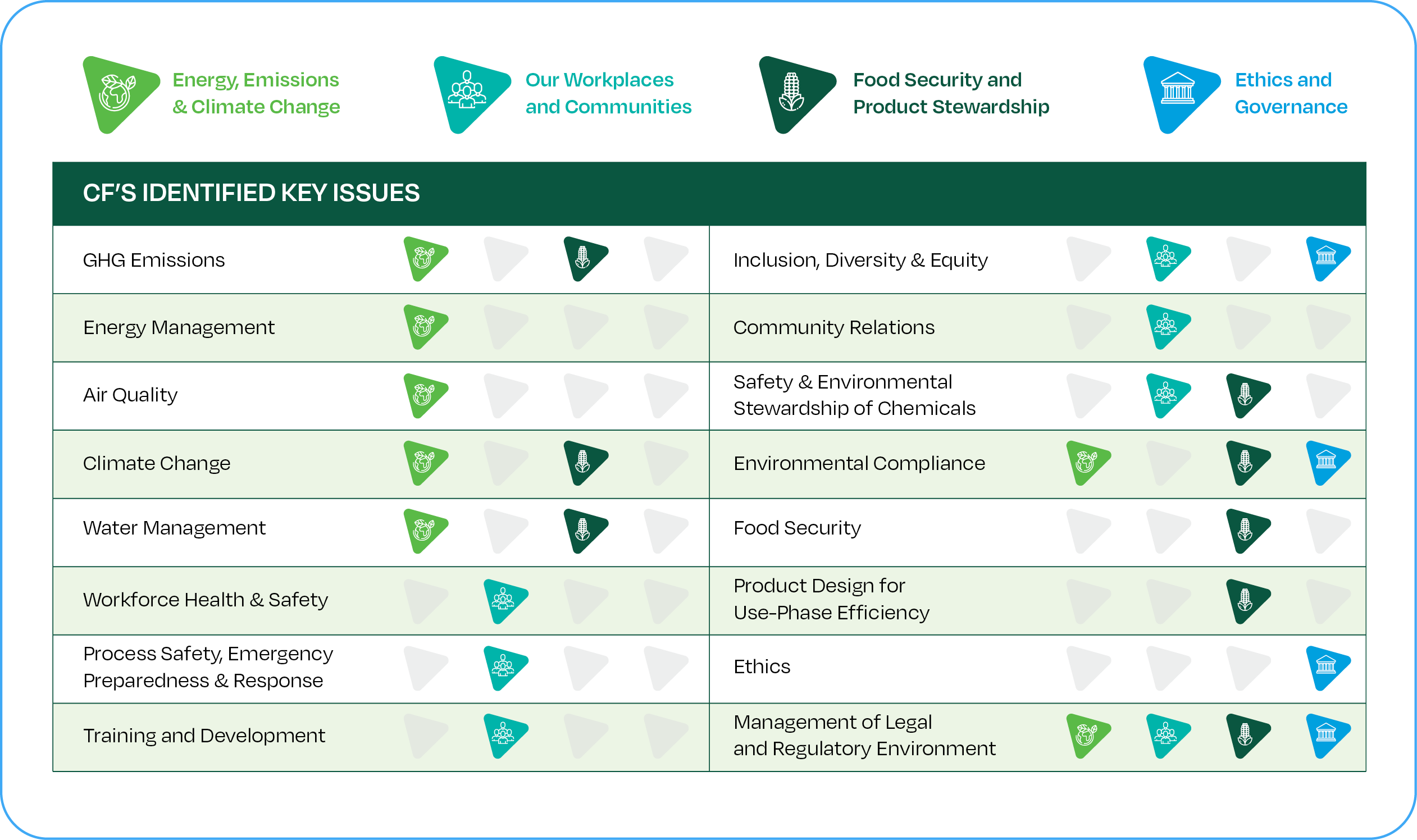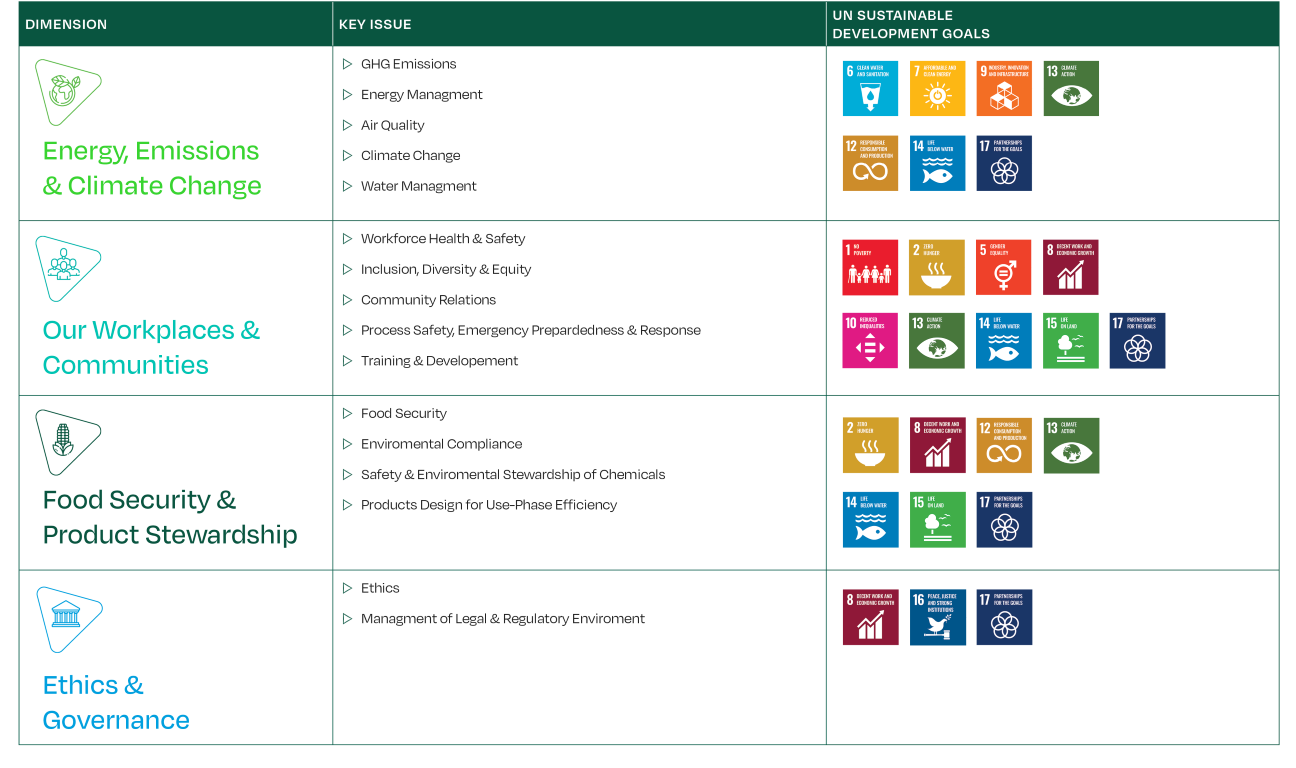Ammonia's role in society
Page content
-
CF Industries is a leading global manufacturer of hydrogen and nitrogen products for clean energy, fertilizer, emissions abatement, and other industrial applications. CF Industries’ core product is anhydrous ammonia, whose chemical symbol is NH3 and is composed of 82% nitrogen and 18% hydrogen. The Company is the world’s largest producer of ammonia on a gross ammonia basis, with an average annual capacity of 10.5 million tons.
Today, ammonia is primarily used for its nitrogen content as a fertilizer itself or as the basis of upgraded nitrogen fertilizers such as granular urea, urea ammonium nitrate (UAN), and ammonium nitrate (AN). Fertilizer is responsible for 50% of global food production, protecting the world’s food supplies and helping to feed a growing global population. Nitrogen-based fertilizers are particularly important in this endeavor, as plants absorb and utilize nitrogen more than any other element during the development process.
Ammonia and its upgraded products, including diesel exhaust fluid, are also used in industrial processes for emissions reduction as well as in the manufacture of plastics, textiles, dyes, and other chemicals. The Company’s principal customers are agricultural cooperatives, independent fertilizer distributors, traders, wholesalers, and other industrial end users.
-
Ammonia has increasingly been identified as a future source of clean energy due to its hydrogen content. Hydrogen has emerged as a leading clean energy source to achieve global greenhouse gas emission reductions and energy stability. Ammonia is expected to contribute to hydrogen’s use as a clean energy source either as a fuel itself because it does not emit carbon when burned, or as a transport and storage medium for its hydrogen content.
Ammonia production relies on the Haber-Bosch process to produce ammonia by synthesizing hydrogen from a fossil fuel feedstock with nitrogen from the air, with CO2 as an inherent byproduct of the process. Natural gas is the principal raw material and primary fuel source used in the ammonia production process at our manufacturing facilities and accounts for approximately 70 percent of the cost to manufacture ammonia.
CF Industries has committed to developing the use of ammonia as a clean energy source by decarbonizing its ammonia production network. To decarbonize this process, the Company is pursuing both blue ammonia production – ammonia produced conventionally with the CO2 byproduct captured and permanently sequestered – and green ammonia production – ammonia produced with hydrogen derived from zero-carbon sources. Blue ammonia is expected to be more cost effective and widely available sooner than green ammonia, with substantial production available by 2030. Green ammonia development is ongoing, but current technology enables smaller production levels at a significantly higher cost. The Company expects both blue and green ammonia to be an important part of achieving its net zero ambitions.
Dimensions and Key Issues
As a result of the Company’s materiality assessment, CF Industries has identified four distinct environmental, social, and governance dimensions that are critical to the long-term success of the Company. Our focus on them helps mitigate business risk and support the health and well-being of all our stakeholders.
1. Energy, Emissions & Climate Change (E)
2. Our Workplaces & Communities (S)
3. Food Security & Product Stewardship (E, S)
4. Ethics & Governance (G)
Our four distinct ESG dimensions are the result of learnings from direct engagement with our shareholders and other key stakeholders. CF Industries believes in fostering open dialogue with all our stakeholders, including investors, employees, and prospective employees, customers, farmers, policymakers, nongovernmental organizations (NGOs), suppliers, trade associations and the communities where we operate. We identify relevant stakeholders as those individuals and/or groups that our people, facilities, and products impact significantly. Examples of stakeholder engagement include:
- Investor calls/conferences
- Customer and supplier meetings/events
- Dialogue with local community leaders
- Shareholder outreach campaigns
- Membership in industry groups and coalitions
- Participation in industry events/conferences
- Partnerships with NGOs
- Engagement with government officials
- Employee surveys and town hall meetings
We undertake ongoing reviews of our stakeholder engagement. To support part of our strategy to leverage our unique capabilities to accelerate the world’s transition to clean energy, we have expanded the group of stakeholders with which we engage on environment, clean energy, and sustainability issues. This includes joining the Hydrogen Council in 2021 and the World Business Council for Sustainable Development (WBCSD) and the Climate Leadership Council in early 2022. During 2021, CF Industries announced a memorandum of understanding (MOU) with Mitsui & Co, Inc., a leading global ammonia marketer, whereby both companies will work together to explore the development of blue ammonia projects in the United States alongside marketing

opportunities in Japan and other countries. The Company is also participating in a Joint Study Framework established by Itochu Corporation to verify and organize common issues regarding the use of ammonia as a maritime fuel. Alongside these efforts, CF Industries has begun working with US policymakers to advocate for a US carbon price, border adjustment mechanism and broader greenhouse gas emission reduction efforts; policies that facilitate infrastructure, and capital investment into clean energy initiatives through appropriate tax and incentive policies, such as enhancements to the 45Q tax credit for CO2 that is captured and stored in secure geologic formations.
Alignment with U.N. Sustainable Development Goals
Our intensive work to identify four ESG dimensions and 16 key issues that align with the UN SDGs ultimately allowed us to develop a comprehensive set of ESG goals for the Company in 2020. We use these goals to track our progress against each of our key issues, all of which are central to achieving our corporate strategy. Our ESG goals are important to CF Industries, as we know that we cannot make progress against our key issues or broader societal SDGs without specific target-setting and progress measurement.
central to achieving our corporate strategy. Our ESG goals are important to CF Industries, as we know that we cannot make progress against our key issues or broader societal SDGs without specific target-setting and progress measurement.
Comprehensive ESG Goals
Our intensive work to identify four ESG dimensions and 16 key issues that align with the UN SDGs ultimately allowed us to develop a comprehensive set of ESG goals for the Company in 2020. We use these goals to track our progress against each of our key issues, all of which are central to achieving our corporate strategy. Our ESG goals are important to CF Industries, as we know that we cannot make progress against our key issues or broader societal SDGs without specific target-setting and progress measurement.

